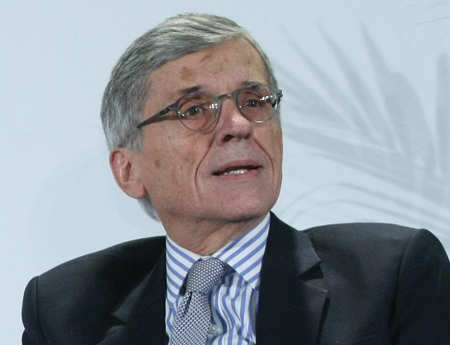FCC’s Disagreeable Take On Sharing Agreements

The smarter way to stay on top of broadcasting and cable industry. Sign up below
You are now subscribed
Your newsletter sign-up was successful
There are some broadcast lawyers and lobbyists who, given the chance to send an untraceable message to the FCC on station ownership, might begin that memo with the words, “At least buy us a drink first.”
Asking not to be identified, they told B&C that FCC chairman Tom Wheeler’s promise to look at joint sales and service agreements on a case-by-case basis appears to have morphed into an effort to regulate by condition before any rules to limit those arrangements are even voted on.
Wheeler has taken a keen interest in deals involving shared services and sales agreements, providing new guidance on sharing agreements in general and making TV joint sales agreements (JSAs) of more than a token amount (15%) attributable as ownership interests.
Exhibit A, broadcasters say, of the effort to discourage sharing arrangements is the FCC Media Bureau’s approval in February of a deal in which Ion Media agreed to pay $7.75 million to settle with creditors of bankrupt Roberts Broadcasting in exchange for which three Roberts TV stations would be spun off into a trust, with Ion as the beneficiary.
According to a copy of the FCC’s approval of one of the station spinoffs— WRBU St. Louis—it must be sold within a year to a third party.
WRBU is in East St. Louis, with St. Louis being the largest market where Ion does not own a station.
Ion couldn’t keep the station because it can’t own any more stations without exceeding the FCC’s (undiscounted) 39% ownership cap. The company is still technically below that threshold since its stations are UHFs, with only 50% of that audience counting toward the national cap. But the FCC has voted to propose doing away with the discount and is treating any new deals as though the discount were already gone.
The smarter way to stay on top of broadcasting and cable industry. Sign up below
Broadcasters familiar with the Ion-Roberts deal suggest Wheeler is already taking the same approach to shared service agreements (SSAs), which the Media Bureau signaled in March would be under scrutiny.
After WRBU is sold out of the trust to a third party, the new owner could affiliate with Ion, or even pay the company to lease equipment, but “shall not permit Ion a role in the station’s local operation.”
That means Ion could not get into the St. Louis market via the SSA—or JSA—route.
After this, the FCC’s WRBU approval contains a paragraph whose effect has triggered angst among broadcasters—many of which have pending deals that are yet to be approved by the commission. “Assignee agrees that, if the independent buyer proposes to obtain services from another in-market station, it will only do so if the licensee of that station could own WRBU under the FCC’s ownership rules or would be entitled under established standards to a waiver of that rule,” the paragraph states.
Not only would that prevent Ion from providing those services to the station, but it would mean the same prevention to any other station group similarly at or above the discounted national cap, or one that could not own another station in the market due to local ownership caps. The only exception would come if a station qualified for a waiver—the FCC allows owners to buy failing stations where they otherwise could not.
An FCC representative said that language was offered by the attorney for the station creditors, not Wheeler. The attorney declined comment on the source of the language. But whoever suggested it, the Media Bureau imposed it as a condition on the deal.
CRITICS TAKE AIM AT FCC’S SSA POLICY
It is now rush hour inside Washington’s Beltway when it comes to media ownership issues. Both sides of the media consolidation equation have taken the FCC to court over its decision to limit joint sales agreements (JSAs) , resulting in three lawsuits stemming from the commission’s JSA decision and guidance from the Media Bureau on how it would look at other sharing agreements when vetting station sales.
Broadcasters say the commission was arbitrary and capricious, and while anti-consolidation activists agree, their beef comes with the FCC’s decision not to crack down on all sharing agreements rather than just JSAs (the FCC asked how it should treat shared services and other agreements).
Meanwhile, Sinclair Broadcast Group has proposed turning in three Allbritton licenses as part of a restructuring of its deal to acquire that station group. Sinclair would make a series of complicated moves, including multicasting programming from the shuttered stations, in order to have no sharing arrangements in the deal, an effort to get the deal approved by a July deadline, when either side can back out.
Contributing editor John Eggerton has been an editor and/or writer on media regulation, legislation and policy for over four decades, including covering the FCC, FTC, Congress, the major media trade associations, and the federal courts. In addition to Multichannel News and Broadcasting + Cable, his work has appeared in Radio World, TV Technology, TV Fax, This Week in Consumer Electronics, Variety and the Encyclopedia Britannica.

